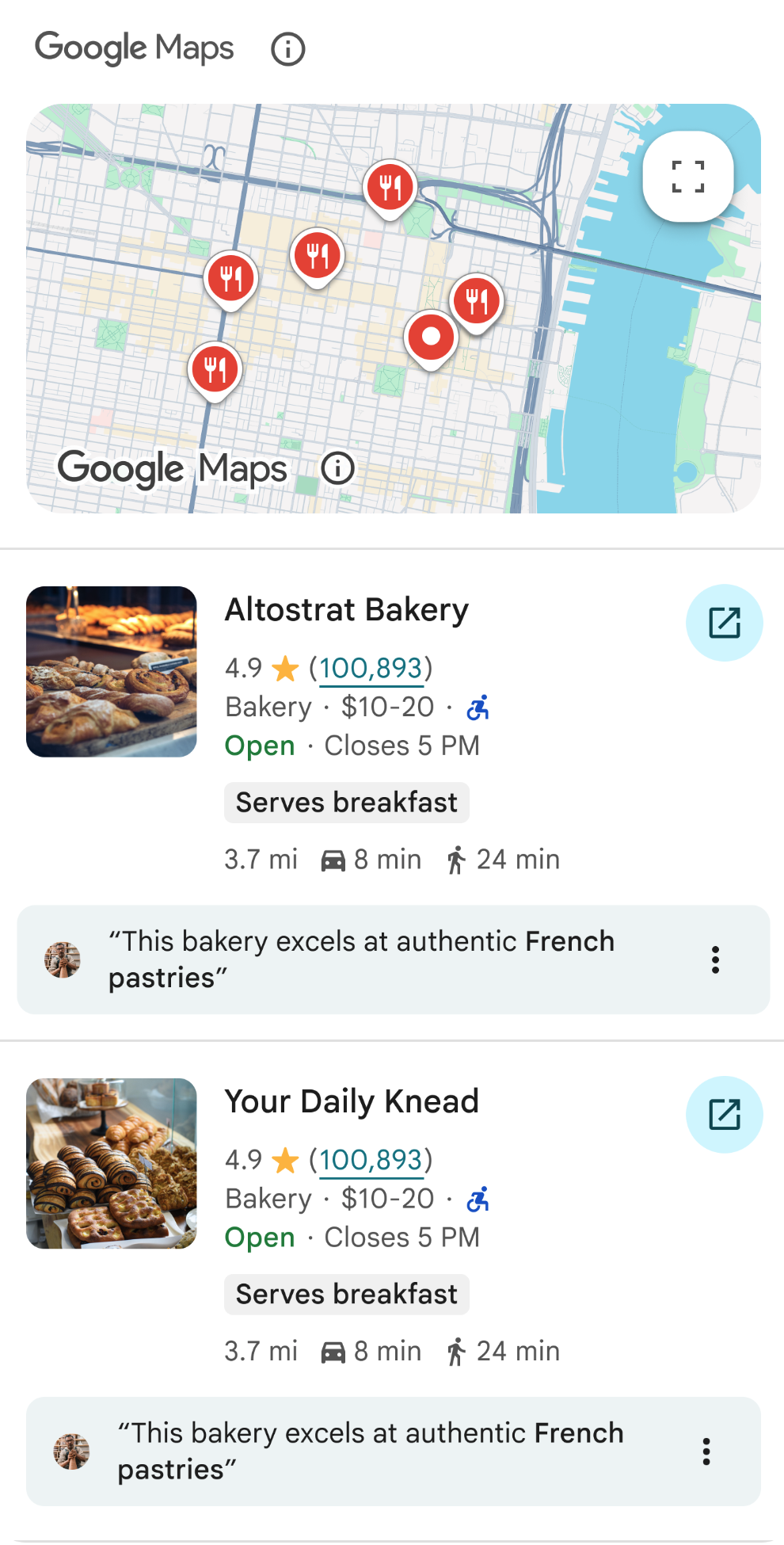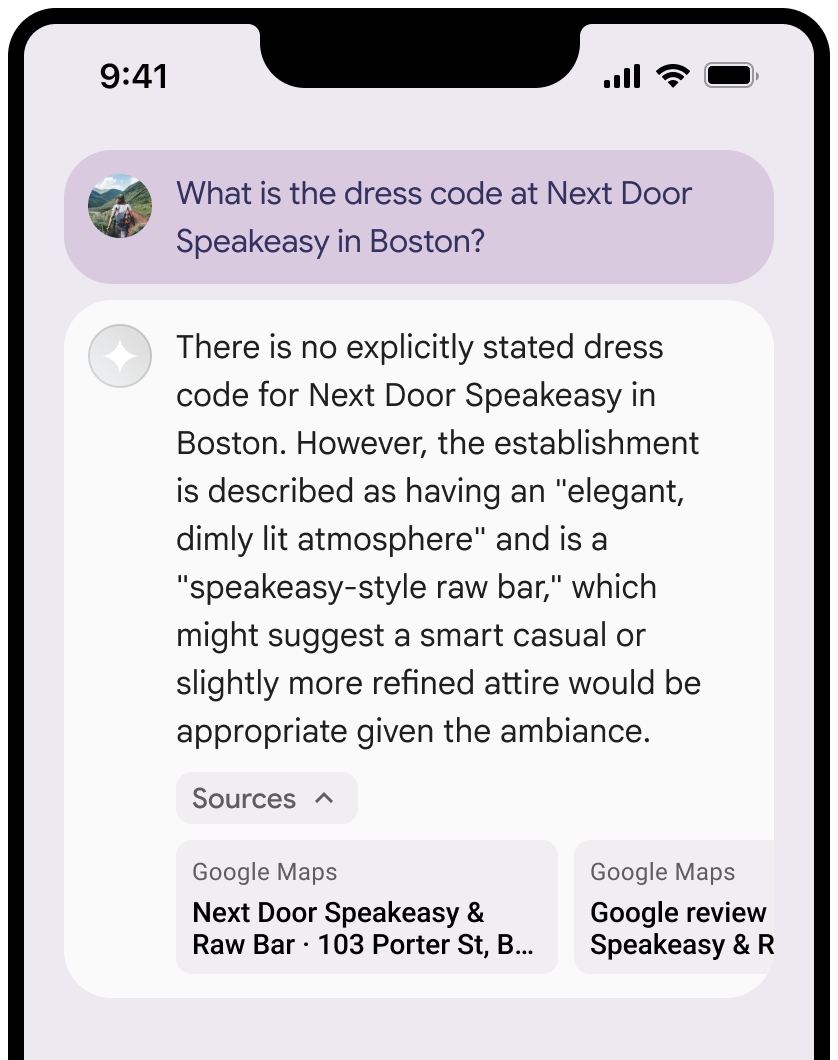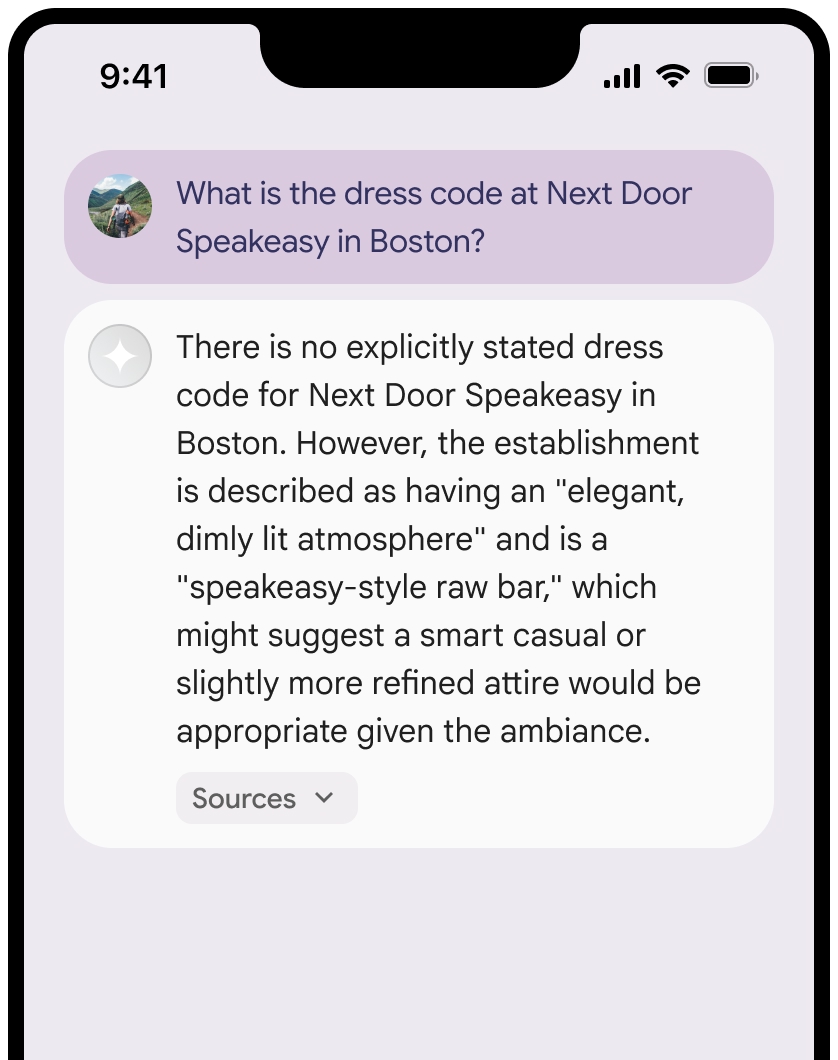การอ้างอิงด้วย Google Maps จะเชื่อมต่อความสามารถในการสร้างของ Gemini กับข้อมูลที่สมบูรณ์ เป็นข้อเท็จจริง และเป็นข้อมูลล่าสุดของ Google Maps ฟีเจอร์นี้ช่วยให้นักพัฒนาแอปผสานรวมฟังก์ชันการทำงานที่รับรู้ตำแหน่งไว้ในแอปพลิเคชันของตนได้อย่างง่ายดาย เมื่อคำค้นหาของผู้ใช้มีบริบทที่เกี่ยวข้องกับข้อมูล Maps โมเดล Gemini จะใช้ประโยชน์จาก Google Maps เพื่อให้คำตอบที่ถูกต้องตามข้อเท็จจริงและเป็นข้อมูลล่าสุด ซึ่ง เกี่ยวข้องกับตำแหน่งที่ผู้ใช้ระบุหรือพื้นที่ทั่วไป
- คำตอบที่ถูกต้องและรับรู้ตำแหน่ง: ใช้ประโยชน์จากข้อมูลที่ครอบคลุมและเป็นปัจจุบันของ Google Maps สำหรับคำค้นหาที่เฉพาะเจาะจงทางภูมิศาสตร์
- การปรับตามโปรไฟล์ของผู้ใช้ที่ดียิ่งขึ้น: ปรับแต่งคำแนะนำและข้อมูลตามตำแหน่งที่ผู้ใช้ระบุ
- ข้อมูลและวิดเจ็ตตามบริบท: โทเค็นบริบทเพื่อแสดงวิดเจ็ต Google Maps แบบอินเทอร์แอกทีฟควบคู่ไปกับเนื้อหาที่สร้างขึ้น
เริ่มต้นใช้งาน
ตัวอย่างนี้แสดงวิธีผสานรวมการอ้างอิงกับ Google Maps เข้ากับแอปพลิเคชันของคุณ เพื่อให้คำตอบที่แม่นยำและรับรู้ตำแหน่งแก่คำค้นหาของผู้ใช้ พรอมต์ขอคำแนะนำในพื้นที่พร้อมตำแหน่งของผู้ใช้ (ไม่บังคับ) เพื่อให้โมเดล Gemini ใช้ประโยชน์จากข้อมูล Google Maps ได้
Python
from google import genai
from google.genai import types
client = genai.Client()
prompt = "What are the best Italian restaurants within a 15-minute walk from here?"
response = client.models.generate_content(
model='gemini-2.5-flash',
contents=prompt,
config=types.GenerateContentConfig(
# Turn on grounding with Google Maps
tools=[types.Tool(google_maps=types.GoogleMaps())],
# Optionally provide the relevant location context (this is in Los Angeles)
tool_config=types.ToolConfig(retrieval_config=types.RetrievalConfig(
lat_lng=types.LatLng(
latitude=34.050481, longitude=-118.248526))),
),
)
print("Generated Response:")
print(response.text)
if grounding := response.candidates[0].grounding_metadata:
if grounding.grounding_chunks:
print('-' * 40)
print("Sources:")
for chunk in grounding.grounding_chunks:
print(f'- [{chunk.maps.title}]({chunk.maps.uri})')
JavaScript
import { GoogleGenAI } from "@google/genai";
const ai = new GoogleGenAI({});
async function generateContentWithMapsGrounding() {
const response = await ai.models.generateContent({
model: "gemini-2.5-flash",
contents: "What are the best Italian restaurants within a 15-minute walk from here?",
config: {
// Turn on grounding with Google Maps
tools: [{ googleMaps: {} }],
toolConfig: {
retrievalConfig: {
// Optionally provide the relevant location context (this is in Los Angeles)
latLng: {
latitude: 34.050481,
longitude: -118.248526,
},
},
},
},
});
console.log("Generated Response:");
console.log(response.text);
const grounding = response.candidates[0]?.groundingMetadata;
if (grounding?.groundingChunks) {
console.log("-".repeat(40));
console.log("Sources:");
for (const chunk of grounding.groundingChunks) {
if (chunk.maps) {
console.log(`- [${chunk.maps.title}](${chunk.maps.uri})`);
}
}
}
}
generateContentWithMapsGrounding();
REST
curl -X POST 'https://generativelanguage.googleapis.com/v1beta/models/gemini-2.5-flash:generateContent' \
-H 'Content-Type: application/json' \
-H "x-goog-api-key: ${GEMINI_API_KEY}" \
-d '{
"contents": [{
"role": "user",
"parts": [{
"text": "What are the best Italian restaurants within a 15-minute walk from here?"
}]
}],
"tools": [{"googleMaps": {}}],
"toolConfig": {
"retrievalConfig": {
"latLng": {"latitude": 34.050481, "longitude": -118.248526}
}
}
}'
วิธีการทำงานของฟีเจอร์กราวด์ด้วย Google Maps
การอ้างอิงด้วย Google Maps จะผสานรวม Gemini API กับระบบนิเวศทางภูมิศาสตร์ของ Google โดยใช้ Maps API เป็นแหล่งที่มาของการอ้างอิง เมื่อคำค้นหาของผู้ใช้ มีบริบททางภูมิศาสตร์ โมเดล Gemini จะเรียกใช้เครื่องมือการอ้างอิงกับ Google Maps ได้ จากนั้นโมเดลจะสร้างคำตอบโดยอิงตามข้อมูล Google Maps ที่เกี่ยวข้องกับสถานที่ที่ระบุ
โดยปกติแล้วกระบวนการนี้จะมีขั้นตอนต่อไปนี้
- คำค้นหาของผู้ใช้: ผู้ใช้ส่งคำค้นหาไปยังแอปพลิเคชันของคุณ ซึ่งอาจรวมถึงบริบททางภูมิศาสตร์ (เช่น "ร้านกาแฟใกล้ฉัน" "พิพิธภัณฑ์ใน ซานฟรานซิสโก")
- การเรียกใช้เครื่องมือ: โมเดล Gemini จะเรียกใช้เครื่องมือการเชื่อมโยงกับ Google Maps เมื่อรับรู้ถึงความตั้งใจทางภูมิศาสตร์
เครื่องมือนี้อาจมี
latitudeและlongitudeของผู้ใช้ให้ด้วยหรือไม่ก็ได้ เครื่องมือนี้เป็นเครื่องมือค้นหาแบบข้อความ และทำงานคล้ายกับการค้นหาใน Maps โดยที่คำค้นหาในพื้นที่ ("ใกล้ฉัน") จะใช้พิกัด ส่วนคำค้นหาที่เฉพาะเจาะจงหรือไม่ใช่ในพื้นที่ จะไม่ได้รับผลกระทบจากตำแหน่งที่ระบุอย่างชัดเจน - การดึงข้อมูล: บริการ Grounding with Google Maps จะค้นหาข้อมูลที่เกี่ยวข้องใน Google Maps (เช่น สถานที่ รีวิว รูปภาพ ที่อยู่ เวลาทำการ)
- การสร้างแบบมีพื้นฐาน: ระบบจะใช้ข้อมูล Maps ที่ดึงมาเพื่อแจ้งคำตอบของโมเดล Gemini เพื่อให้มั่นใจถึงความถูกต้องตามข้อเท็จจริงและความเกี่ยวข้อง
- โทเค็นคำตอบและวิดเจ็ต: โมเดลจะแสดงคำตอบเป็นข้อความ ซึ่งมี
การอ้างอิงแหล่งที่มาจาก Google Maps ไม่บังคับ การตอบกลับของ API อาจมี
google_maps_widget_context_tokenด้วย ซึ่งช่วยให้นักพัฒนาแอปแสดงวิดเจ็ต Google Maps ตามบริบทในแอปพลิเคชันเพื่อการโต้ตอบด้วยภาพได้
เหตุผลและเวลาที่ควรใช้การอ้างอิงกับ Google Maps
การอ้างอิงกับ Google Maps เหมาะสำหรับแอปพลิเคชันที่ต้องการข้อมูลที่ถูกต้อง เป็นปัจจุบัน และเฉพาะเจาะจงตำแหน่ง โดยจะช่วยยกระดับประสบการณ์ของผู้ใช้ ด้วยการแสดงเนื้อหาที่เกี่ยวข้องและปรับเปลี่ยนในแบบของคุณ ซึ่งขับเคลื่อนโดยฐานข้อมูลขนาดใหญ่ของ Google Maps ที่มีสถานที่กว่า 250 ล้านแห่งทั่วโลก
คุณควรใช้การอ้างอิงกับ Google Maps เมื่อแอปพลิเคชันของคุณต้องการทำสิ่งต่อไปนี้
- ตอบคำถามที่เฉพาะเจาะจงตามภูมิศาสตร์ให้ถูกต้องสมบูรณ์
- สร้างเครื่องมือวางแผนการเดินทางและไกด์นำเที่ยวในพื้นที่แบบสนทนา
- แนะนำจุดที่น่าสนใจตาม ตำแหน่งและความชอบของผู้ใช้ เช่น ร้านอาหารหรือร้านค้า
- สร้างประสบการณ์ที่รับรู้ตำแหน่งสำหรับบริการโซเชียล การค้าปลีก หรือการนำส่งอาหาร
การอ้างอิงจาก Google Maps เหมาะอย่างยิ่งสำหรับกรณีการใช้งานที่ต้องใช้ข้อมูลความใกล้เคียงและข้อมูลข้อเท็จจริงปัจจุบัน เช่น การค้นหา "ร้านกาแฟที่ดีที่สุดใกล้ฉัน" หรือการขอเส้นทาง
เมธอดและพารามิเตอร์ของ API
การอ้างอิงกับ Google Maps จะแสดงผ่าน Gemini API เป็นเครื่องมือภายในเมธอด generateContent คุณเปิดใช้และกำหนดค่า
การอ้างอิงจาก Google Maps ได้โดยการรวมออบเจ็กต์
googleMaps ไว้ในพารามิเตอร์ tools ของคำขอ
JSON
{
"contents": [{
"parts": [
{"text": "Restaurants near Times Square."}
]
}],
"tools": { "googleMaps": {} }
}
นอกจากนี้ เครื่องมือ googleMaps ยังยอมรับenableWidget
พารามิเตอร์บูลีน ซึ่งใช้เพื่อควบคุมว่าระบบจะแสดงผลฟิลด์ googleMapsWidgetContextToken
ในการตอบกลับหรือไม่ ซึ่งใช้เพื่อแสดงวิดเจ็ตสถานที่ตามบริบทได้
JSON
{
"contents": [{
"parts": [
{"text": "Restaurants near Times Square."}
]
}],
"tools": { "googleMaps": { "enableWidget": true } }
}
นอกจากนี้ เครื่องมือยังรองรับการส่งตำแหน่งตามบริบทเป็น toolConfig
JSON
{
"contents": [{
"parts": [
{"text": "Restaurants near here."}
]
}],
"tools": { "googleMaps": {} },
"toolConfig": {
"retrievalConfig": {
"latLng": {
"latitude": 40.758896,
"longitude": -73.985130
}
}
}
}
ทำความเข้าใจการตอบกลับที่อิงตามข้อมูล
เมื่อการตอบกลับอิงตามข้อมูล Google Maps สำเร็จ การตอบกลับจะมีฟิลด์ groundingMetadata
ข้อมูลที่มีโครงสร้างนี้มีความสำคัญอย่างยิ่งต่อการยืนยันการอ้างสิทธิ์และการสร้างประสบการณ์การอ้างอิงที่สมบูรณ์ในแอปพลิเคชันของคุณ รวมถึงการปฏิบัติตามข้อกำหนดในการใช้งานบริการ
JSON
{
"candidates": [
{
"content": {
"parts": [
{
"text": "CanteenM is an American restaurant with..."
}
],
"role": "model"
},
"groundingMetadata": {
"groundingChunks": [
{
"maps": {
"uri": "https://maps.google.com/?cid=13100894621228039586",
"title": "Heaven on 7th Marketplace",
"placeId": "places/ChIJ0-zA1vBZwokRon0fGj-6z7U"
},
// repeated ...
}
],
"groundingSupports": [
{
"segment": {
"startIndex": 0,
"endIndex": 79,
"text": "CanteenM is an American restaurant with a 4.6-star rating and is open 24 hours."
},
"groundingChunkIndices": [0]
},
// repeated ...
],
"webSearchQueries": [
"restaurants near me"
],
"googleMapsWidgetContextToken": "widgetcontent/..."
}
}
]
}
Gemini API จะแสดงข้อมูลต่อไปนี้พร้อมกับ
groundingMetadata
groundingChunks: อาร์เรย์ของออบเจ็กต์ที่มีแหล่งที่มาของmaps(uri,placeIdและtitle)groundingSupports: อาร์เรย์ของก้อนข้อมูลเพื่อเชื่อมต่อข้อความคำตอบของโมเดลกับ แหล่งที่มาในgroundingChunksแต่ละก้อนจะลิงก์ช่วงข้อความ (กำหนดโดยstartIndexและendIndex) กับgroundingChunkIndicesอย่างน้อย 1 รายการ ซึ่งเป็น กุญแจสำคัญในการสร้างการอ้างอิงในบรรทัดgoogleMapsWidgetContextToken: โทเค็นข้อความที่ใช้ในการแสดงผล วิดเจ็ตสถานที่ตามบริบท
ดูข้อมูลโค้ดที่แสดงวิธีแสดงผลการอ้างอิงในข้อความได้ที่ตัวอย่าง ในเอกสารการอ้างอิงด้วย Google Search
แสดงวิดเจ็ตตามบริบทของ Google Maps
หากต้องการใช้ googleMapsWidgetContextToken ที่ส่งคืน คุณต้องโหลด
Google Maps JavaScript
API
กรณีการใช้งาน
การอ้างอิงกับ Google Maps รองรับกรณีการใช้งานที่หลากหลายซึ่งรับรู้ตำแหน่ง ตัวอย่างต่อไปนี้แสดงให้เห็นว่าพรอมต์และพารามิเตอร์ต่างๆ สามารถใช้ประโยชน์จาก การอ้างอิงกับ Google Maps ได้อย่างไร ข้อมูลในผลลัพธ์ภาคพื้นของ Google Maps อาจ แตกต่างจากสภาพจริง
การจัดการคำถามเกี่ยวกับสถานที่
ถามคำถามโดยละเอียดเกี่ยวกับสถานที่หนึ่งๆ เพื่อรับคำตอบตามรีวิวของผู้ใช้ Google และข้อมูลอื่นๆ ของ Maps
Python
from google import genai
from google.genai import types
client = genai.Client()
prompt = "Is there a cafe near the corner of 1st and Main that has outdoor seating?"
response = client.models.generate_content(
model='gemini-2.5-flash',
contents=prompt,
config=types.GenerateContentConfig(
# Turn on the Maps tool
tools=[types.Tool(google_maps=types.GoogleMaps())],
# Provide the relevant location context (this is in Los Angeles)
tool_config=types.ToolConfig(retrieval_config=types.RetrievalConfig(
lat_lng=types.LatLng(
latitude=34.050481, longitude=-118.248526))),
),
)
print("Generated Response:")
print(response.text)
if grounding := response.candidates[0].grounding_metadata:
if chunks := grounding.grounding_chunks:
print('-' * 40)
print("Sources:")
for chunk in chunks:
print(f'- [{chunk.maps.title}]({chunk.maps.uri})')
```
JavaScript
import { GoogleGenAI } from '@google/genai';
const ai = new GoogleGenAI({});
async function run() {
const prompt = "Is there a cafe near the corner of 1st and Main that has outdoor seating?";
const response = await ai.models.generateContent({
model: 'gemini-2.5-flash',
contents: prompt,
config: {
// Turn on the Maps tool
tools: [{googleMaps: {}}],
// Provide the relevant location context (this is in Los Angeles)
toolConfig: {
retrievalConfig: {
latLng: {
latitude: 34.050481,
longitude: -118.248526
}
}
}
},
});
console.log("Generated Response:");
console.log(response.text);
const chunks = response.candidates[0].groundingMetadata?.groundingChunks;
if (chunks) {
console.log('-'.repeat(40));
console.log("Sources:");
for (const chunk of chunks) {
if (chunk.maps) {
console.log(`- [${chunk.maps.title}](${chunk.maps.uri})`);
}
}
}
}
run();
REST
curl -X POST 'https://generativelanguage.googleapis.com/v1beta/models/gemini-2.5-flash:generateContent' \
-H 'Content-Type: application/json' \
-H "x-goog-api-key: ${GEMINI_API_KEY}" \
-d '{
"contents": [{
"role": "user",
"parts": [{
"text": "Is there a cafe near the corner of 1st and Main that has outdoor seating?"
}]
}],
"tools": [{"googleMaps": {}}],
"toolConfig": {
"retrievalConfig": {
"latLng": {"latitude": 34.050481, "longitude": -118.248526}
}
}
}'
การปรับเปลี่ยนในแบบของคุณตามตำแหน่ง
รับคำแนะนำที่ปรับให้เหมาะกับค่ากำหนดของผู้ใช้และพื้นที่ทางภูมิศาสตร์ที่เฉพาะเจาะจง
Python
from google import genai
from google.genai import types
client = genai.Client()
prompt = "Which family-friendly restaurants near here have the best playground reviews?"
response = client.models.generate_content(
model='gemini-2.5-flash',
contents=prompt,
config=types.GenerateContentConfig(
tools=[types.Tool(google_maps=types.GoogleMaps())],
tool_config=types.ToolConfig(retrieval_config=types.RetrievalConfig(
# Provide the location as context; this is Austin, TX.
lat_lng=types.LatLng(
latitude=30.2672, longitude=-97.7431))),
),
)
print("Generated Response:")
print(response.text)
if grounding := response.candidates[0].grounding_metadata:
if chunks := grounding.grounding_chunks:
print('-' * 40)
print("Sources:")
for chunk in chunks:
print(f'- [{chunk.maps.title}]({chunk.maps.uri})')
JavaScript
import { GoogleGenAI } from '@google/genai';
const ai = new GoogleGenAI({});
async function run() {
const prompt = "Which family-friendly restaurants near here have the best playground reviews?";
const response = await ai.models.generateContent({
model: 'gemini-2.5-flash',
contents: prompt,
config: {
tools: [{googleMaps: {}}],
toolConfig: {
retrievalConfig: {
// Provide the location as context; this is Austin, TX.
latLng: {
latitude: 30.2672,
longitude: -97.7431
}
}
}
},
});
console.log("Generated Response:");
console.log(response.text);
const chunks = response.candidates[0].groundingMetadata?.groundingChunks;
if (chunks) {
console.log('-'.repeat(40));
console.log("Sources:");
for (const chunk of chunks) {
if (chunk.maps) {
console.log(`- [${chunk.maps.title}](${chunk.maps.uri})`);
}
}
}
}
run();
REST
curl -X POST 'https://generativelanguage.googleapis.com/v1beta/models/gemini-2.5-flash:generateContent' \
-H 'Content-Type: application/json' \
-H "x-goog-api-key: ${GEMINI_API_KEY}" \
-d '{
"contents": [{
"role": "user",
"parts": [{
"text": "Which family-friendly restaurants near here have the best playground reviews?"
}],
}],
"tools": [{"googleMaps": {}}],
"toolConfig": {
"retrievalConfig": {
"latLng": {"latitude": 30.2672, "longitude": -97.7431}
}
}
}'
ช่วยวางแผนการเดินทาง
สร้างแผนการเดินทางหลายวันพร้อมเส้นทางและข้อมูลเกี่ยวกับสถานที่ต่างๆ เหมาะสำหรับแอปพลิเคชันการเดินทาง
ในตัวอย่างนี้ มีการขอ googleMapsWidgetContextToken โดยการเปิดใช้
วิดเจ็ตในเครื่องมือ Google Maps เมื่อเปิดใช้แล้ว คุณจะใช้โทเค็นที่ส่งคืน
เพื่อแสดงวิดเจ็ตสถานที่ตามบริบทได้โดยใช้ <gmp-places-contextual> component
จาก Google Maps JavaScript API
Python
from google import genai
from google.genai import types
client = genai.Client()
prompt = "Plan a day in San Francisco for me. I want to see the Golden Gate Bridge, visit a museum, and have a nice dinner."
response = client.models.generate_content(
model='gemini-2.5-flash',
contents=prompt,
config=types.GenerateContentConfig(
tools=[types.Tool(google_maps=types.GoogleMaps(enable_widget=True))],
tool_config=types.ToolConfig(retrieval_config=types.RetrievalConfig(
# Provide the location as context, this is in San Francisco.
lat_lng=types.LatLng(
latitude=37.78193, longitude=-122.40476))),
),
)
print("Generated Response:")
print(response.text)
if grounding := response.candidates[0].grounding_metadata:
if grounding.grounding_chunks:
print('-' * 40)
print("Sources:")
for chunk in grounding.grounding_chunks:
print(f'- [{chunk.maps.title}]({chunk.maps.uri})')
if widget_token := grounding.google_maps_widget_context_token:
print('-' * 40)
print(f'<gmp-place-contextual context-token="{widget_token}"></gmp-place-contextual>')
JavaScript
import { GoogleGenAI } from '@google/genai';
const ai = new GoogleGenAI({});
async function run() {
const prompt = "Plan a day in San Francisco for me. I want to see the Golden Gate Bridge, visit a museum, and have a nice dinner.";
const response = await ai.models.generateContent({
model: 'gemini-2.5-flash',
contents: prompt,
config: {
tools: [{googleMaps: {enableWidget: true}}],
toolConfig: {
retrievalConfig: {
// Provide the location as context, this is in San Francisco.
latLng: {
latitude: 37.78193,
longitude: -122.40476
}
}
}
},
});
console.log("Generated Response:");
console.log(response.text);
const groundingMetadata = response.candidates[0]?.groundingMetadata;
if (groundingMetadata) {
if (groundingMetadata.groundingChunks) {
console.log('-'.repeat(40));
console.log("Sources:");
for (const chunk of groundingMetadata.groundingChunks) {
if (chunk.maps) {
console.log(`- [${chunk.maps.title}](${chunk.maps.uri})`);
}
}
}
if (groundingMetadata.googleMapsWidgetContextToken) {
console.log('-'.repeat(40));
document.body.insertAdjacentHTML('beforeend', `<gmp-place-contextual context-token="${groundingMetadata.googleMapsWidgetContextToken}`"></gmp-place-contextual>`);
}
}
}
run();
REST
curl -X POST 'https://generativelanguage.googleapis.com/v1beta/models/gemini-2.5-flash:generateContent' \
-H 'Content-Type: application/json' \
-H "x-goog-api-key: ${GEMINI_API_KEY}" \
-d '{
"contents": [{
"role": "user",
"parts": [{
"text": "Plan a day in San Francisco for me. I want to see the Golden Gate Bridge, visit a museum, and have a nice dinner."
}]
}],
"tools": [{"googleMaps": {"enableWidget":"true"}}],
"toolConfig": {
"retrievalConfig": {
"latLng": {"latitude": 37.78193, "longitude": -122.40476}
}
}
}'
เมื่อแสดงผลวิดเจ็ตแล้ว วิดเจ็ตจะมีลักษณะดังนี้

ข้อกำหนดในการใช้งานบริการ
ส่วนนี้อธิบายข้อกำหนดในการใช้บริการสำหรับ Grounding with Google Maps
แจ้งให้ผู้ใช้ทราบเกี่ยวกับการใช้แหล่งข้อมูลของ Google Maps
ผลการค้นหาที่อิงตามข้อมูลจริงของ Google Maps แต่ละรายการจะมีแหล่งข้อมูลใน groundingChunks
ที่สนับสนุนคำตอบแต่ละรายการ นอกจากนี้ ระบบยังแสดงข้อมูลเมตาดังต่อไปนี้ด้วย
- URI ต้นทาง
- title
- รหัส
เมื่อนำเสนอผลลัพธ์จาก Grounding with Google Maps คุณต้องระบุแหล่งที่มาของ Google Maps ที่เกี่ยวข้อง และแจ้งให้ผู้ใช้ทราบข้อมูลต่อไปนี้
- แหล่งที่มาของ Google Maps ต้องอยู่ต่อจากเนื้อหาที่สร้างขึ้นซึ่งแหล่งที่มานั้นรองรับ เนื้อหาที่สร้างขึ้นนี้เรียกอีกอย่างว่าผลลัพธ์ที่อิงตามข้อมูลจริงของ Google Maps
- แหล่งข้อมูลของ Google Maps ต้องดูได้ภายใน 1 การโต้ตอบของผู้ใช้
แสดงแหล่งข้อมูล Google Maps ด้วยลิงก์ Google Maps
สำหรับแหล่งที่มาแต่ละรายการใน groundingChunks และใน
grounding_chunks.maps.placeAnswerSources.reviewSnippets ระบบจะต้องสร้างตัวอย่างลิงก์
ตามข้อกำหนดต่อไปนี้
- ระบุแหล่งที่มาแต่ละแหล่งไปยัง Google Maps ตามข้อความของ Google Maps หลักเกณฑ์การระบุแหล่งที่มา
- แสดงชื่อแหล่งข้อมูลที่ระบุไว้ในการตอบกลับ
- ลิงก์ไปยังแหล่งที่มาโดยใช้
uriหรือgoogleMapsUriจากคำตอบ
รูปภาพเหล่านี้แสดงข้อกำหนดขั้นต่ำสำหรับการแสดงแหล่งที่มาและลิงก์ Google Maps

คุณยุบมุมมองของแหล่งที่มาได้

ไม่บังคับ: ปรับปรุงตัวอย่างลิงก์ด้วยเนื้อหาเพิ่มเติม เช่น
- ระบบจะแทรกฟาวิคอนของ Google Maps ก่อนข้อความระบุแหล่งที่มาของ Google Maps
- รูปภาพจาก URL แหล่งที่มา (
og:image)
ดูข้อมูลเพิ่มเติมเกี่ยวกับผู้ให้บริการข้อมูล Google Maps บางรายและข้อกำหนดของใบอนุญาตได้ที่ประกาศทางกฎหมายของ Google Maps และ Google Earth
หลักเกณฑ์การระบุแหล่งที่มาของข้อความใน Google Maps
เมื่อระบุแหล่งที่มาของ Google Maps ในข้อความ ให้ทำตามหลักเกณฑ์ต่อไปนี้
- โปรดอย่าแก้ไขข้อความ Google Maps ในลักษณะใดก็ตาม
- อย่าเปลี่ยนการใช้อักษรตัวพิมพ์ใหญ่ของ Google Maps
- อย่าวาง Google Maps ในหลายบรรทัด
- อย่าแปล Google Maps เป็นภาษาอื่น
- ป้องกันไม่ให้เบราว์เซอร์แปล Google Maps โดยใช้แอตทริบิวต์ HTML translate="no"
- จัดรูปแบบข้อความ Google Maps ตามที่อธิบายไว้ในตารางต่อไปนี้
| พร็อพเพอร์ตี้ | รูปแบบ |
|---|---|
Font family |
Roboto คุณจะโหลดฟอนต์หรือไม่ก็ได้ |
Fallback font family |
แบบอักษร Sans Serif ที่ใช้ในผลิตภัณฑ์อยู่แล้ว หรือ "Sans-Serif" เพื่อเรียกใช้แบบอักษรเริ่มต้นของระบบ |
Font style |
ปกติ |
Font weight |
400 |
Font color |
สีขาว สีดำ (#1F1F1F) หรือสีเทา (#5E5E5E) รักษาระดับความแตกต่างที่เข้าถึงได้ (4.5:1) กับพื้นหลัง |
Font size |
|
Spacing |
ปกติ |
ตัวอย่าง CSS
CSS ต่อไปนี้จะแสดงผล Google Maps ด้วยรูปแบบการพิมพ์และสีที่เหมาะสมบนพื้นหลังสีขาวหรือสีอ่อน
CSS
@import url('https://fonts.googleapis.com/css2?family=Roboto&display=swap');
.GMP-attribution {
font-family: Roboto, Sans-Serif;
font-style: normal;
font-weight: 400;
font-size: 1rem;
letter-spacing: normal;
white-space: nowrap;
color: #5e5e5e;
}
โทเค็นบริบท รหัสสถานที่ และรหัสรีวิว
ข้อมูล Google Maps ประกอบด้วยโทเค็นบริบท รหัสสถานที่ และรหัสรีวิว คุณอาจแคช จัดเก็บ และส่งออกข้อมูลการตอบกลับต่อไปนี้
googleMapsWidgetContextTokenplaceIdreviewId
ข้อจำกัดในการแคชในข้อกำหนดการเชื่อมต่อกับ Google Maps จะไม่ มีผล
กิจกรรมและเขตแดนที่ไม่อนุญาต
การใช้ฟีเจอร์กราวด์ด้วย Google Maps มีข้อจำกัดเพิ่มเติมสำหรับเนื้อหาและ กิจกรรมบางอย่างเพื่อรักษาแพลตฟอร์มให้ปลอดภัยและเชื่อถือได้ นอกเหนือจากข้อจำกัดในการใช้งานในข้อกำหนดแล้ว คุณจะไม่ใช้การอ้างอิงกับ Google Maps สำหรับกิจกรรมที่มีความเสี่ยงสูง ซึ่งรวมถึงบริการช่วยเหลือฉุกเฉิน คุณจะไม่เผยแพร่หรือทำการตลาดแอปพลิเคชันที่นำเสนอการกราวด์ด้วย Google Maps ในเขตแดนที่ถูกห้าม เขตแดนที่ห้ามในปัจจุบันมีดังนี้
- จีน
- ไครเมีย
- คิวบา
- สาธารณรัฐประชาชนดอแนตสก์
- อิหร่าน
- สาธารณรัฐประชาชนลูฮันสก์
- เกาหลีเหนือ
- ซีเรีย
- เวียดนาม
รายการนี้อาจได้รับการอัปเดตเป็นครั้งคราว
แนวทางปฏิบัติแนะนำ
- ระบุตำแหน่งของผู้ใช้: เพื่อให้ได้คำตอบที่เกี่ยวข้องและปรับเปลี่ยนในแบบของคุณมากที่สุด
ให้ระบุ
user_location(ละติจูดและลองจิจูด) ในการกำหนดค่าgoogleMapsGroundingเสมอเมื่อทราบตำแหน่งของผู้ใช้ - แสดงวิดเจ็ตตามบริบทของ Google Maps: วิดเจ็ตตามบริบทจะแสดงโดยใช้โทเค็นบริบท
googleMapsWidgetContextTokenซึ่งจะแสดงในคำตอบของ Gemini API และใช้เพื่อแสดงเนื้อหาภาพจาก Google Maps ได้ ดูข้อมูลเพิ่มเติมเกี่ยวกับวิดเจ็ตตามบริบทได้ที่ วิดเจ็ตการอ้างอิงด้วย Google Maps ในคู่มือนักพัฒนาซอฟต์แวร์ของ Google - แจ้งผู้ใช้ปลายทาง: แจ้งให้ผู้ใช้ปลายทางทราบอย่างชัดเจนว่าระบบกำลังใช้ข้อมูล Google Maps เพื่อตอบคำค้นหาของผู้ใช้ โดยเฉพาะเมื่อเปิดใช้เครื่องมือ
- ตรวจสอบเวลาในการตอบสนอง: สำหรับแอปพลิเคชันแบบสนทนา ให้ตรวจสอบว่าเวลาในการตอบสนอง P95 สำหรับคำตอบที่อิงตามข้อมูลยังคงอยู่ภายในเกณฑ์ที่ยอมรับได้เพื่อ รักษาประสบการณ์ของผู้ใช้ที่ราบรื่น
- ปิดเมื่อไม่จำเป็น: การกราวด์ด้วย Google Maps จะปิดอยู่โดยค่าเริ่มต้น เปิดใช้ (
"tools": [{"googleMaps": {}}]) เฉพาะเมื่อการค้นหามีบริบททางภูมิศาสตร์ที่ชัดเจน เพื่อเพิ่มประสิทธิภาพและต้นทุน
ข้อจำกัด
- ขอบเขตทางภูมิศาสตร์: ปัจจุบันฟีเจอร์การปักหมุดด้วย Google Maps พร้อมให้บริการทั่วโลก
- การรองรับโมเดล: เฉพาะโมเดล Gemini บางรุ่นเท่านั้นที่รองรับการอ้างอิงจาก Google Maps ได้แก่ Gemini 2.5 Flash-Lite, Gemini 2.5 Pro, Gemini 2.5 Flash และ Gemini 2.0 Flash (แต่ไม่รองรับ 2.0 Flash Lite)
- อินพุต/เอาต์พุตหลายรูปแบบ: ขณะนี้การอ้างอิงกับ Google Maps ไม่รองรับอินพุตหรือเอาต์พุตหลายรูปแบบนอกเหนือจากข้อความและวิดเจ็ตแผนที่ตามบริบท
- สถานะเริ่มต้น: เครื่องมือการอ้างอิงด้วย Google Maps จะปิดอยู่โดยค่าเริ่มต้น คุณต้องเปิดใช้ฟีเจอร์นี้อย่างชัดแจ้งในคำขอ API
ราคาและขีดจำกัดอัตรา
การอ้างอิงกับ Google Maps จะมีราคาตามการค้นหา ปัจจุบันอัตราค่าบริการคือ $25 / 1,000 พรอมต์ที่อิงตามความจริง นอกจากนี้ รุ่นฟรียังมีคำขอได้สูงสุด 500 รายการต่อวัน ระบบจะนับคำขอเป็นส่วนหนึ่งของโควต้าก็ต่อเมื่อพรอมต์แสดงผลลัพธ์ที่อิงตามข้อมูลของ Google Maps อย่างน้อย 1 รายการสำเร็จ (เช่น ผลลัพธ์ที่มีแหล่งที่มาของ Google Maps อย่างน้อย 1 รายการ) หากมีการส่งการค้นหาหลายรายการไปยัง Google Maps จากคำขอเดียว ระบบจะนับเป็นคำขอเดียวตาม ขีดจำกัดอัตรา
ดูข้อมูลการกำหนดราคาโดยละเอียดได้ที่หน้าราคาของ Gemini API
รุ่นที่รองรับ
คุณดูความสามารถของโมเดลได้ในหน้าภาพรวมของโมเดล
| รุ่น | การเชื่อมต่อแหล่งข้อมูลกับ Google Maps |
|---|---|
| Gemini 2.5 Pro | ✔️ |
| Gemini 2.5 Flash | ✔️ |
| Gemini 2.5 Flash-Lite | ✔️ |
| Gemini 2.0 Flash | ✔️ |
ขั้นตอนถัดไป
- ลองใช้การอ้างอิงด้วย Google Search ในสูตรการแก้ปัญหาของ Gemini API
- ดูข้อมูลเกี่ยวกับเครื่องมืออื่นๆ ที่พร้อมใช้งาน เช่น Function Calling
- ดูข้อมูลเพิ่มเติมเกี่ยวกับแนวทางปฏิบัติแนะนำด้าน AI ที่มีความรับผิดชอบและตัวกรองความปลอดภัยของ Gemini API ได้ที่คู่มือการตั้งค่าความปลอดภัย
